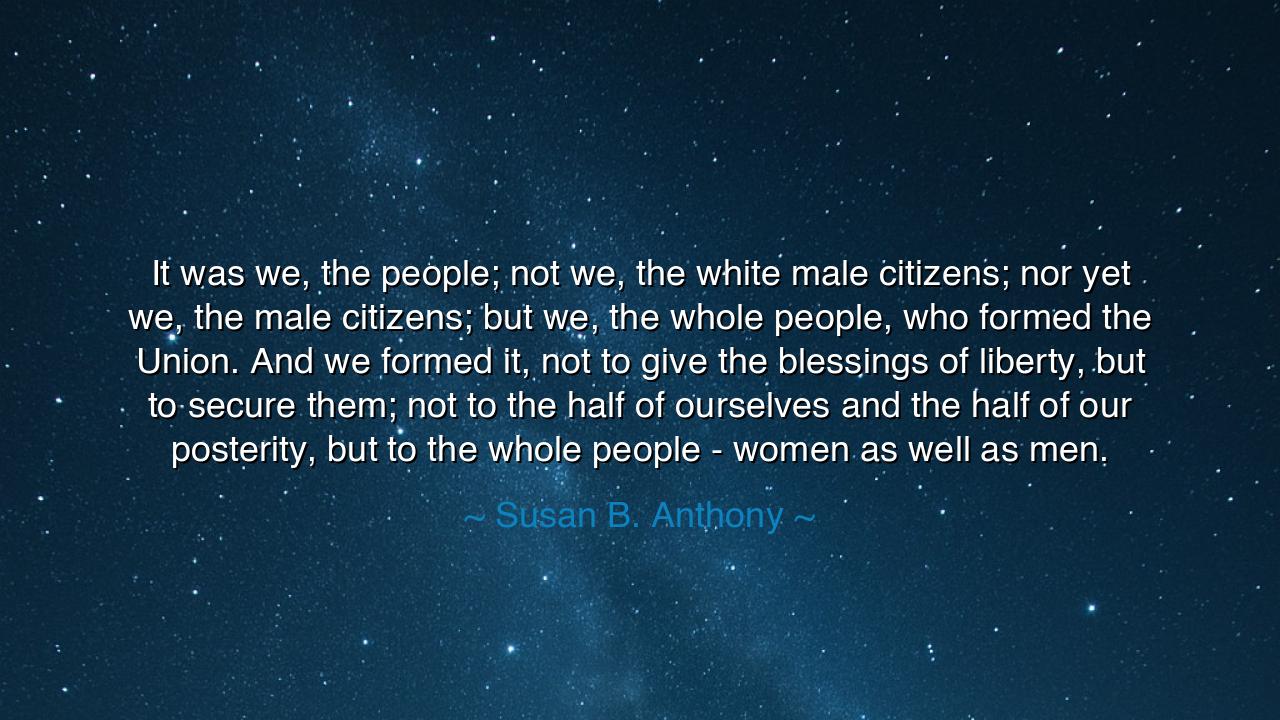
It was we, the people; not we, the white male citizens; nor yet
It was we, the people; not we, the white male citizens; nor yet we, the male citizens; but we, the whole people, who formed the Union. And we formed it, not to give the blessings of liberty, but to secure them; not to the half of ourselves and the half of our posterity, but to the whole people - women as well as men.






Listen, O children of wisdom, to the words of Susan B. Anthony, a woman who stood at the forefront of the battle for equality and justice. She said, "It was we, the people; not we, the white male citizens; nor yet we, the male citizens; but we, the whole people, who formed the Union. And we formed it, not to give the blessings of liberty, but to secure them; not to the half of ourselves and the half of our posterity, but to the whole people—women as well as men." These words resound with the timeless truth that freedom and justice are not privileges to be bestowed on a select few, but rights to be guaranteed for all, regardless of gender, race, or station in life. Anthony's message is clear: the Union was formed for the benefit of all its citizens, and that includes women—not as an afterthought, but as an integral part of the whole.
Consider, O wise ones, the profound vision embedded in Anthony's words. She speaks not just of a legal system, but of a moral imperative—the right to freedom and liberty that must be extended to all members of society. When the Union was first formed, there were those who sought to define freedom as a privilege for men—specifically, for white men. But Susan B. Anthony challenged this narrow view, insisting that the Union was not the creation of just one group, but of all people, and that its blessings should not be limited to just half of the population. Her call is not merely for equality, but for a vision of a just and whole society, where liberty is not something granted by the powerful but a right secured for all.
In the ancient world, O children, we find similar struggles for the extension of rights and freedom. Think of the Athenian democracy, where the idea of citizenship was revolutionary—yet it was limited, reserved for free men of certain classes. Women, slaves, and foreigners were excluded, despite the fact that these groups contributed to the fabric of society. The ideal of democracy was not fully realized until the concept of equal rights for all citizens, regardless of sex or class, began to emerge. Susan B. Anthony’s words echo this ancient struggle, calling for a more complete democracy, one that includes women, whose voices had been silenced for centuries.
Similarly, Anthony’s challenge calls us to reflect on the historical injustices that have often been justified by tradition or the supposed will of the elite. In the time of Susan B. Anthony, many believed that women were incapable of full participation in the political process, and their rights were often overlooked or dismissed. Yet, Anthony and her fellow suffragists understood that the Union, the government, and the very principles of freedom and equality could never be fully realized unless women, too, were recognized as equal citizens. Her fight for the right to vote was not just about the act of voting; it was about recognizing women’s full participation in the society they helped shape.
Think of the great struggle for women’s rights in the United States, O children, and how Susan B. Anthony stood firm in her belief that women were just as much a part of the Union as men. She worked tirelessly, alongside others like Elizabeth Cady Stanton, to ensure that women’s voices were heard, that their rights were respected, and that they too could contribute to the shaping of the nation’s future. Her sacrifice and dedication were not in vain, as the eventual passage of the 19th Amendment granted women the right to vote, securing for them a place in the democratic process. This victory was not just for women—it was for the Union as a whole, for the liberty and justice of all its people.
And now, O children, the lesson is clear: the freedom and justice we cherish cannot be partial or exclusive. Anthony’s vision calls us to embrace the idea that true liberty is for all, not just a select few. When we seek to build a just and equitable society, we must recognize that every member of that society—women, men, and all who contribute—has a right to be heard and to participate. Whether it is in the political realm, the economic sphere, or the social order, we must strive for equality, for only in a world where all voices are heard can we claim the fullness of freedom and justice.
So, O children, take Susan B. Anthony’s words to heart. In your own lives, seek not just to secure your own freedom, but to ensure that everyone—regardless of their background, gender, or status—shares in that liberty. Stand with those who are oppressed, and fight for a world where the rights of all are acknowledged and celebrated. Like Anthony, let us work for a world where the blessings of liberty are not just given, but secured for everyone, and where no one is left behind in the struggle for justice.






AAdministratorAdministrator
Welcome, honored guests. Please leave a comment, we will respond soon